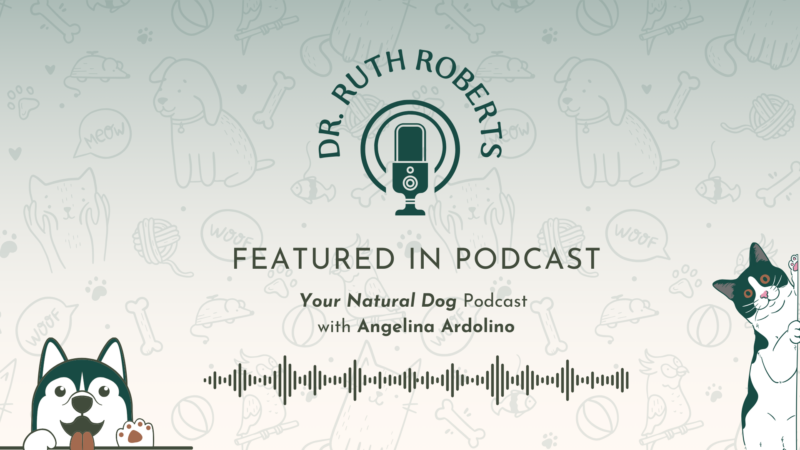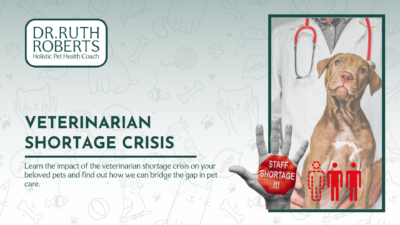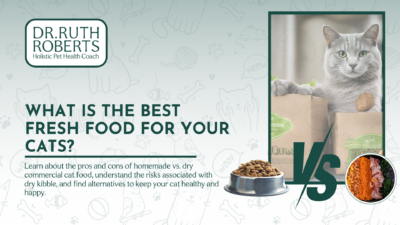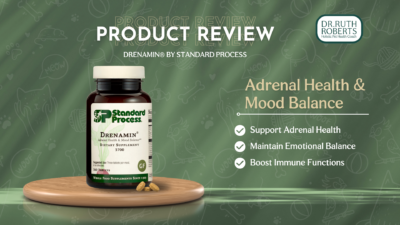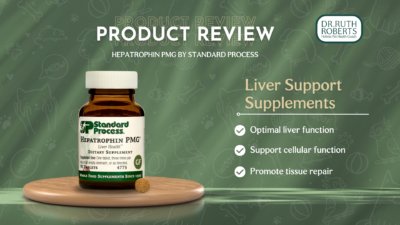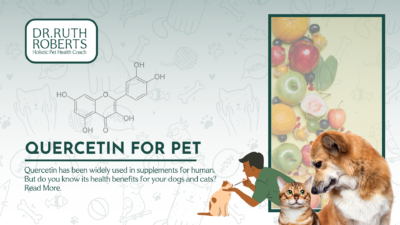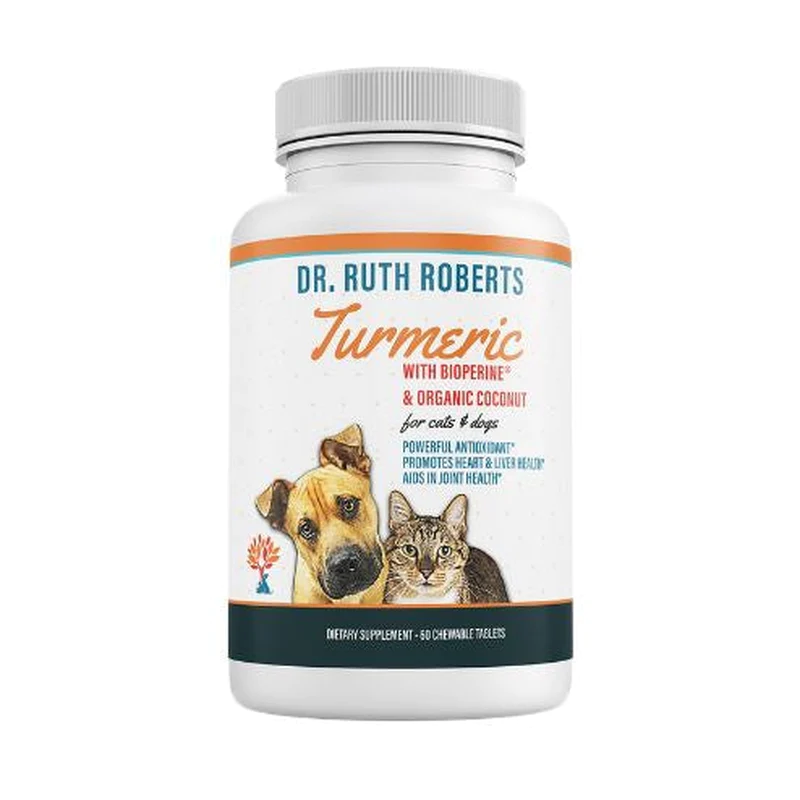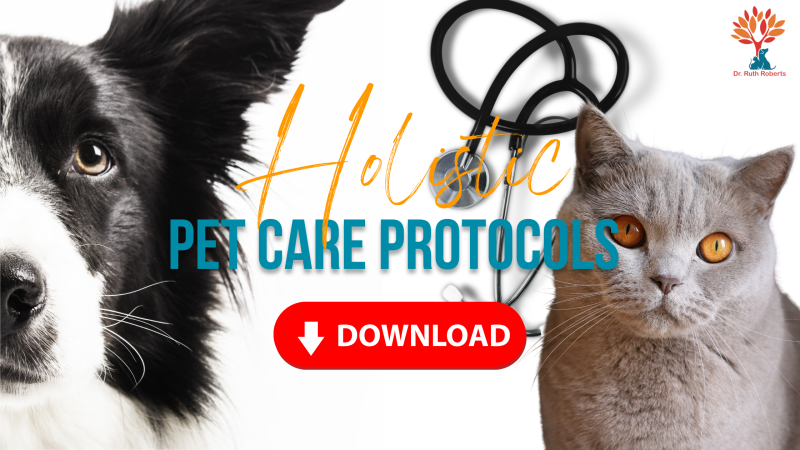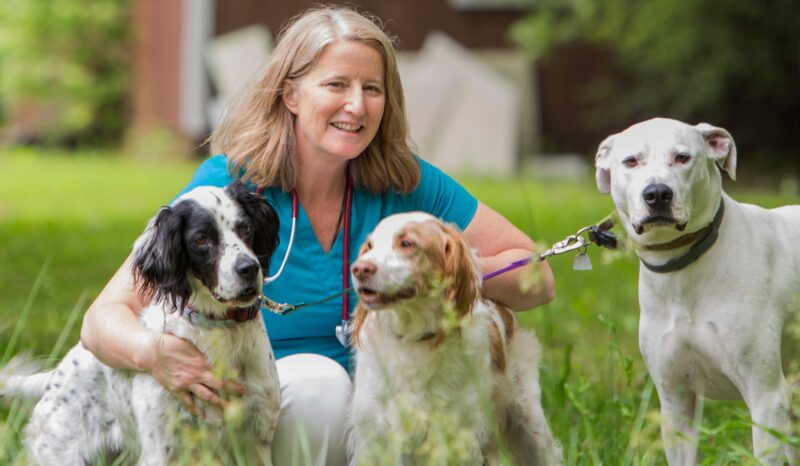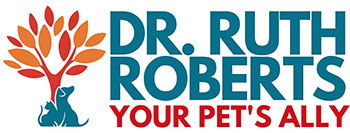Traditional Chinese Veterinary Medicine &
Food Therapy for Pet
This is an episode of Your Natural Dog podcast with Angela Ardolino, packed with valuable insights for you seeking holistic care for your beloved pet. Dive into Dr. Ruth Roberts’ personal journey to traditional veterinary medicine and the profound impact of Traditional Chinese Veterinary Medicine, including the use of herbs and food therapy for optimal pet health. You’ll also learn about the power of food therapy in supporting dogs with cancer. You’ll understand the idea of using certain foods to cool or warm your pet. Plus, you’ll find out how functional medicine can make a big difference in keeping your pet healthy by tailoring treatments and taking preventive steps.
Intro
[00:00:00]
Angela Ardolino: Hey everyone, it’s Angela Ardolino with your natural dog. And I know I always say this, but she is one of my favorite holistic and integrative veterinarians, Dr. Ruth Roberts is on today. I literally can have her on and talk. Way too much about holistic health and food therapy. She has been a holistic and integrated vet for over 30 years. She’s trained in traditional Chinese medicine, which is, what we’re gonna talk a lot about today, so that we can understand it and how this amazing 5,000 year old medicine has, you know, worked so well and could help your pet. So I wanted, wanted to talk to her a little bit about that and also, How, one of my favorite things about her is that she basically is a coach for pet parents, like she literally tries to help us and teach us how to understand and do what’s best for our pets. So, tune in, tune in. We’re gonna talk about all these fun things with Dr. Ruth Roberts coming up next.
Holistic Veterinary Medicine: Natural Alternative to Conventional Treatment
[00:01:10]
Angela Ardolino: And we’re back with your natural dog. And this is Angela Ardolino, and I’m with Dr. Ruth Roberts. How you doing?
Dr. Ruth Roberts: I am fantastic. Angela, how are you?
Angela Ardolino: I am fantastic and I always love when I see that I get to talk to you because I always love our conversations. Matter of fact, we just spent 20 minutes talking before we record it, and I’m like, you know what? We just need to record our conversation.
Angela Ardolino: And why I love having a conversation with you is because I get the message all the time that gosh. We want. It’s like I’m stuck between this. Put on everybody, you know, the message of you must consult your veterinarian. Don’t forget to consult your veterinarian before you do anything. I, I don’t feel comfortable giving that message anymore. And I told you about a story that I just went to went through and I’m always telling everyone, look for a holistic veterinarian first, look for an integrative second. If you have no choice, get your x-rays and blood work done and then do telehealth with a, a holistic or integrative. But not all holistic and integrative vets are created equal.
Angela Ardolino: As you know, the success I’ve had with my dog, my Doberman Nina with Osteosarcoma who we’re trying to verify that she’s the longest living dog who had her leg up to 22 months and now she’s passed two years from her diagnosis. And I didn’t do a single thing of convention actually. Would amputation be considered conventional or that would be. What, what would that, what would that be considered,
Dr. Ruth Roberts: You know, here, here’s an interesting thing. So I had a, actually, in practice, I had a dog that lived to 18 months past her same place right in the wrist, 18 months past diagnosis, the, didn’t believe it was osteosarcoma anymore. Took her to NC State that took a biopsy and it exploded. So this is..
Angela Ardolino: Wow. I love that you told this story because, you know, if they hadn’t taken that biopsy, You, you would’ve been in the same. Same boat as I am, because I didn’t touch that tumor. I didn’t understand how the heck do you take a, a biopsy from it. And I also was so frightened of all the stories of, you know, taking, trying to see if that tumor is is cancer or not. So I didn’t do that, but I did, yeah, get to send the leg in. And verify because the same thing happened to me. Nobody believed it was osteosarcoma when she made it to 18 months and didn’t think she was gonna make it past.
Dr. Ruth Roberts: You do the right things. And for her, that’s where I used a lot of Chinese medicine for this dog. And so this dog got out 18 months. She had some swelling around her foot.
Angela Ardolino: Yep. That’s what happened to Nina.
Dr. Ruth Roberts: Yeah. And that was, and that’s kind of typical. The only time I would really biopsy. In the past with osteosarcoma as if I was going to take the leg off because it was already so painful that it just had no. I mean, there was no point in, in the dog keeping the leg. And this sounds a little ludicrous perhaps, but if we can relieve pain, that takes a whole gamut of things that we have to do for this dog away. And so that was kind of it. But I mean that’s, it’s to me, I mean, it’s amazing that Nina has gone 22 months, but..
Angela Ardolino: It’s two years now. Two years now.
Dr. Ruth Roberts: I mean, that’s just astonishing.
Angela Ardolino: Thank you. That’s I, and honestly, I think that now that we’ve got cannabis that we can legally work with, it is the most incredible thing that you can add with traditional Chinese medicine because it’s all the same wonderful herbs. Most of them probably interact with the endocannabinoid system anyway, and literally it was adaptogenic herbs. Cannabis, both a full spectrum hemp extract and the cannabis extract and medicinal mushrooms and a diet that was, you know, supporting her and not feeding the cancer. So when you really like break it down, you go, okay, wait a minute, and when this happened, you can imagine I was freaking out and I had the opportunity to practice what I learned and what I learned from you, what I learned from the University of Vermont about cannabis. And I wanna thank you because, You are the number one, holistic vet that’s out there that is coaching us pet parents who really wanna know and do better, you know, on our second or third time around with our pets, we wanna get this right. And I really do feel like I have.
Dr. Ruth Roberts: That’s so sweet, thankyou.
Angela Ardolino: So thank you for, for being that person. It, it’s It’s means the world to me and everybody who discovers you feels that way too. There’s definitely a big group of us out there that not only have taken control over our own health, but wanna take control over our family and our pet’s health and realize that the system is broken. So I love that I can ask you and go. Why, how, like for instance, I have a client that came into the store. Her dog has she, they said osteosarcoma in the, I guess in the sinuses. So she’s got a, the dog’s got a tumor on the head and it said you know, nothing we can do, you should euthanize today. And she’s like, I’m not doing that. So she came, she’s using my CB. 30 days there’s a visible shrinkage of the tumor on the dog’s head. She takes the dog in. And he goes, wow. And she’s like, yeah, isn’t that incredible? And he’s like, yeah, what’d you do? What are you doing? I’m doing a full spectrum hemp. Great. We’ll keep on doing that.
Dr. Ruth Roberts: Exactly. Yeah.
Angela Ardolino: Not wouldn’t you? How is a doctor, how is a vet who’s in there to help animals not go? This is incredible. Like I, I keep waiting for that response for me, like where they’re going. What did you. What did you do?
Challenges in Conventional Veterinary Treatment
Dr. Ruth Roberts: It, it’s really, it’s hilarious. And I’ve had, when I was still in Charleston, I called up a colleague of mine and I really, I’d love this practice in internal medicine because they were, you know, they were to the point, they were completely conventional, but they gave the client the information they need and the pet, the treatment that was gonna best support them.
[00:06:58]
Dr. Ruth Roberts: So I’m talking to her about this patient we shared who had a horrible adrenal tumor and just really had massive problems secondary to it. She got through it, she got down the road and she ended up with a stupid side effect issue where she had eaten two drugs that were giving her essentially a stomach ulcer. So I call up my colleague to say, “Hey, my, you know, my client’s coming in and he needs some help with the ulcer therapy. They have some fluids and things like that”, and she’s like, “that dog is still alive?”. I’m like, “yep”. And she’s like, whoa. So we would get–
Angela Ardolino: –but they didn’t ask. They didn’t say, Hey, what’d you do? What happened? That’s amazing.
Dr. Ruth Roberts: It was, it was interesting, the oncologist there, her mother was a classically trained homeopath, so we actually did trade some things back and forth, and that was super cool. Like she told me about immunity, and I told her about Yunnan Baiyao for Hemangiosarcomas. So it was a lot. That was, that was awesome. But it’s unusual. And the thing is, is that it takes. Okay, now I have this information. Now what do I do with it? And this is what we were chatting about. It’s like either I’ve gotta really change what I’m doing and dig in and start to learn things, or I have to I have to just hunker down and keep doing what I’ve been doing because, I’m too overwhelmed to take the take the time to learn something new and learn how to implement it, even if it’s in a cookbook way. And that’s where I think we see so many people, so many veterinarians, really. Becoming difficult to work with. Let’s just put it that way.
Angela Ardolino: But I it, yeah, clients are difficult, so I get it.
Dr. Ruth Roberts: Well, and I don’t what’s going on with my profession and, and honestly, at many times I am, I’m embarrassed and heartbroken because people are not doing the job that they need to do. Even if it’s in conventional medicine, they’re not doing it properly. They’re telling cats, people with cats that have very early kidney failure, oh, just put it to sleep so it doesn’t suffer. And it’s like cats gonna live an average of 11 to 1300 days longer. Are you kidding?
Angela Ardolino: Right. Right. .
Dr. Ruth Roberts: So it’s just like, well, i dont know what’s going on.
Angela Ardolino: It’s the same thing with cancer. I just, of course, I wanna know everything, how I did what I did, because I wanna be able to explain it to the masses so that I can explain to people, this is what cancer is, this is how it works, and this is how cannabis medicinal mushrooms and these amazing herbs work to prevent it from spreading metastasizing, from growing, from even forming a tumor, from even allowing your cells to even go continue going rogue. So it is, I can explain that now and it makes so sense. Yeah. So much sense to me and it and it makes me very mad when, A, I discovered that veterinary oncology has only been around for a couple years, and then I went down this rabbit hole of, I found a piece of research or a review talking about whether chemotherapy and radiation is even a ethical to do on animals because not only do the chemotherapy comes out in their skin when you take the dog back home and that you could contaminate yourself, your family, your house, but that the pet can’t tell you. I I feel really awful. I feel like I’m gonna die. I hurt, heal. I feel this. So that makes sense to me and I have no problem saying that because. There are other things that you can do that my dog had the most painful cancer there was, and I was able to control her pain completely with cannabis. So, there’s, you can’t, you can’t tell me that I have to do the radiation or oh my gosh, the amputation. Because everyone thinks, especially in bone cancer, that if you cut the leg off, you cut the tumor out, you’ve gotten rid of the cancer and that’s not how cancer works.
Dr. Ruth Roberts: No it doesn’t. But you know, I’ll have to say Angela, I mean, it’s not for everybody, but there are cases where, Chemotherapy and radiation therapy can be really useful, but you have to understand what
Angela Ardolino: When?
Dr. Ruth Roberts: You’re, well, I mean, honestly.
Angela Ardolino: And how do you find that person that, like, literally there’s two vets that I would trust Dr. Pope and Dr. Huzzah. Other than that, I wouldn’t, I wouldn’t go to one of those special, you know, one that has the cancer difficulty specialist popping up now and I’m like, oh yeah. It’s just like humans so much money they’re gonna make. Yeah, right.
Dr. Ruth Roberts: Well, but I have to say, I mean I have seen that really benefit dogs and it’s not for everybody, but if you can reduce pain, and granted, this is before, I think Canna-Pet had finally launched their product and that wasn’t a great one, but it was helpful.
Angela Ardolino: Right.
Dr. Ruth Roberts: But if. If this stops pain and ultimately gives this dog a quality of life without taking away quality of life, I think that’s okay. The, but what you think of, and what most people think of with all of this is like, you know, the, the old joke on the human side for oncologists, the oncologist is the one of the funeral that jumps into the casket and starts a line. And that there is that too. I mean, it, it’s just, you know, so there is that too. I think you have to, a piece of, a piece of salt, if you will, and think your way through it. What is really gonna provide the best options and result for my dog, for my cat? And this is the other thing that is so frustrating is that, It’s hard to get information to understand what to do to have a reliable source. And that’s what people are battling today. I mean, right. You did all the digging and you still ended up with crazy show for me. That’s ridiculous.
Angela Ardolino: I know. I know it’s hard. I mean, I’m like, what is it too late for me to become a veterinarian? What do you spell mama? Oh, she’s so cute.
Dr. Ruth Roberts: She’s like, oh yeah.
Angela Ardolino: Oh, those of you who can’t, and you’re just listening. She’s got her poodle on her lap, so, and she’s a great poodle and she’s very cute and she’s looking out at the view. It’s beautiful. I love it. She is.
Dr. Ruth Roberts: She’s protecting us from all the evil spirits.
Traditional Chinese Veterinary Medicine (TCVM) for Pet
Angela Ardolino: I like it. But yeah. So I’d love that. You were talking about how we were comparing stories about how you had wonderful success with a dog, with Chinese medicine with osteosarcoma. What other, like, what am other amazing things have you been able to do with it and that you don’t see? You know, you see such great results. I just love that it’s just all good, you know, that it’s,
Dr. Ruth Roberts: it’s all good
Angela Ardolino: And that I don’t ever have any bad side effects and I don’t have to worry about them, you know, anything being harmed. So tell me like some of your best cases.
Dr. Ruth Roberts: So, so the, the story I do have to tell you is when I was studying Chinese medicine, they gave us samples of different herbs to take home. And everybody was freaking out in my class because they gave us hemp seeds, which is, which is to help with constipation. They’re like, are, ‘are we gonna get arrested on the plane?’ And it’s like, dude, this is hemp, not marijuana. You’re good. But, but, but it was, it was amazing. And how this started for me with Chinese medicine. Is I had a dog with bacterial endocarditis and, and as I was studying, so literally I’m looking at a lesion on her heart valve that is this big. So we, I did the conventional stuff because this is where I was in my career and, and we got the bacterial infection under control, got the heart supported, took her down with me to Florida, to the Chi Institute, and I said, To ask my instructors, I need some help with this girl. And so they gave me the acupuncture points. They said, start cooking for her, and gave me some herbal formulas. Well, this dog was not having acupuncture, just no, but she thought the food therapy was an outstanding idea, and the herbs were an outstanding idea. And I’m not kidding you, over three months, I watched it shrink down to three millimeters or about the thickness of a piece of paper. So this is at nine years of age at 13. She finally passed away. But I mean, that’s just astonishing. Bacterial endocarditis kills dogs. So that was..
Angela Ardolino: How do they get it? What is it? How do they, what is it caused from?
Dr. Ruth Roberts: It’s, it’s literally a, that’s the big question. It’s a bacterial infection. So whether that started out from the kidneys or from teeth or from what? I don’t, you know, this is the question is where does it start? But we don’t know often. But I mean, there’s that girl, my own girl. The dog I told you about with the osteosarcoma. I had a dog that had a cutaneous hemangiosarcoma, which is pretty unusual. And literally between the herbs and e and cooked food designed for the specific pattern, this harmony that this dog had. He cleared that tumor and he,
Angela Ardolino: I love it.
Dr. Ruth Roberts: You know, I think this was it like, Seven or eight. This guy lived to be 13, which is pretty outstanding for a Labrador.
Angela Ardolino: That is awesome. So I, I want the message to be heard that what I think, and you could tell me if I’m crazy, I know you agree with me already, is that traditional Chinese medicine is amazing. And I mean cannabis, they used cannabis for, you know, 1800 years ago and they still use it. And I think they only use hemp seeds in clinical practice, but they’ve used all parts of the plant and the past, and it’s just prohibition that made them stop and that they don’t do it anymore. But big believers in it because it’s, to me, it’s just the king of adaptogens and herbs. It’s just another one that’s just super powerful. So when you add cannabis, And remember when I’m talking cannabis, I’m talking about marijuana and and hemp. If you need it, depending what you, what each pet needs. You add that with traditional and you add that with food therapy. How are, how traditional Chinese medicine do they use mushrooms? Medicinal mushrooms?
Dr. Ruth Roberts: There are some mushrooms, but they’re more, they’re for different, different aspects. So largely they’re used to drain damp and so damp, for instance, lipomas are phlegm nodules, damp. Turns into phlegm when it’s cooked for too long. Lympho sarcoma’s also a, a phlegm nodule, strangely enough. So it, it’s sort of a different approach. But I mean the, they’ve used Turkey tail all sorts of things, reishi mushrooms, shitake, all of these that’s different way than we have. Yeah.
Angela Ardolino: Right. So what my point is, is Chinese medicine, cannabis, medicinal mushrooms and diet. I feel like you really can get ahold of just about anything. Do you agree ?
Dr. Ruth Roberts: at, at least, at the very least, you can make that pet’s quality of life better.
Angela Ardolino: And and you’re supporting their immune system to help fight off whatever it is
Dr. Ruth Roberts: you’re supporting. Exactly. You’re supporting the body to reduce inflammation and. Prevent assets from being delivered to the cancer instead of to the dog. That’s really the kinda the way I approach it.
Angela Ardolino: Yeah. I love it. We’re starving that cancer. We don’t wanna feed it.
Dr. Ruth Roberts: Right on.
Angela Ardolino: I, I think that is amazing. So if we have that information, knowing that these are the things that could really help our pet no matter what’s going on, and then what can you do on past that point would be super helpful. Now we talk about, you’re talking about damp and cool and hot. I know that there’s Chinese medicine also applies to food therapy. So for instance, the little I know and that has been so helpful to me is, you know, hot proteins versus cool proteins and hot veggies versus cool veggies. Explain that to our audience.
Dr. Ruth Roberts: So that’s, that’s a concept that is pretty foreign to us. So the nature that the idea that there are natures of, of foods that will either be warming, cooling, draining neutral temperature, and then have other special properties like tonifying blood with a capital B, meaning it’s the Chinese medical concept and not the red stuff that flows out. If you cut yourself tonifying blood chi, yin yang and Jing or Essence. And so the idea is that you could look at common formulas, herbal formulas. Okay? So for instance, with osteosarcomas, hemangiosarcomas, these are blood stagnation tumors. And so the goal would be to tonify blood, tonify chi and then give herbs to help keep things moving. And so it turns out that some of those herbs like curcumin or turmeric, we used in much larger doses to, to do the same thing. So it’s, it’s a little more subtle as far as the way the herbs are used, but the overall effect is the same in that we are supporting the body to do what it knows how to do instead of. using things that are going to just focus on kill the tumor. So that’s kind of where the difference is. There’s a lot more subtleties. Does that make sense?
Angela Ardolino: It does. So, shoot, what was I gonna ask? I was gonna, I was like trying to think of how to but I can’t remember. I’m gonna, let’s take a break. I know I have to take a break. Lauren’s telling us we have to take a commercial break, but Yeah, I wanna ask you an important question when we come back right after this.
Chinese Herbs and CBD for Dogs with Cancer
[00:21:18]
Angela Ardolino: All right, we’re back with Dr. Ruth Roberts and we’re talking about traditional Chinese medicine and why it’s so why I’m so attracted to it is because it’s kind of the same concept of cannabis and hemp and medicinal mushrooms and how they’re either all interacting with our immune system, helping to support it to do what it needs to do, and. all of them we know are interacting with the endocannabinoid system. And if we’re dealing with cancer, we know that they’re dealing with the 12 pathways of cancer. So when you go get a chemotherapy drug, usually those drugs are dealing with one pathway to cancer. When you combine these herbs and cannabis and mushrooms, you’re dealing with all 12 of them. And not only are you dealing with all 12, some of them you’re, you’re up, what is it? Upregulating ’em to, to help do something or downgrading to make ’em stop doing something or completely blocking to prevent, you know, spread or growth. Explain that.
Dr Ruth Roberts: Well, so this is the, the thing that’s astonishing. I mean, the science coming out about Chinese herbal formulas is astonishing, but what you have to remember is this is a system of medicine that was developed well over 5,000 years ago for humans, and there are written text for animals. Of course…
Angela Ardolino: It really makes us wonder why we’re not going back to what’s been working for five, thousands years. Why did we get away from it ? Big Pharma?
Dr Ruth Roberts: Well, I think part of it is it doesn’t work in all situations. It’s like every system of medicine, it has its own set of shortcomings. So there..
Angela Ardolino: but by now we know what it does work.
Dr. Ruth Roberts: Well, we do know where it works, but, but it takes a great deal of skill. And so this is the problem, is that because medicine is a business, it, there’s not access for everybody.
Angela Ardolino: Got it.
Dr. Ruth Roberts: And that’s, that’s part of it. I think if you look at things like What Dr. Chris Besson has done with Herb Smith. She has some of the more common Chinese herbal formulas available. Over the counter, because, we, I mean, this lots and lots, blah, blah, blah. Anyway, huge frustration out there with, with vets. And so this is a way to take the system of medicine and make it more approachable for most people, and it doesn’t always work. Because you have to find the right patient fit. It’s just as you know, some other holistic plan may not work, homeopathy may not work for a particular patient, so you have to find the right fit for that person and that pet. But it is, it was developed through a series of observations, which is why some of it sounds so crazy to us. So for instance, There are several formulas for Shen disturbance or anxiety, and one of them is for shen disturbance. That is crazy dancing naked on the roof. So..
Angela Ardolino: I want to take that one.
Dr. Ruth Roberts: Yeah
Angela Ardolino: I want that to happen
Dr. Ruth Roberts: Some of it’s, well, it’s just stop it because
Angela Ardolino: I know I don’t wanna stop that.
Dr. Ruth Roberts: You know, culturally they’re very, very conservative, I think is a good way. So this is, but I mean, some of it is very poetic and very elegantly put, but it was developed through a series of observations, well, what happens if we do this and what happens if we do that? And then how can we explain what this person has?
Angela Ardolino: And I wanna say, Yeah, I’m almost saying and I may be remembering this wrong, but I wanna say that they started working with cannabis because they were observing animals, eating or reacting to it, and then going, huh? There might be something to this. Am I wrong, the oldest, or am I mixing up the story?
Dr. Ruth Roberts: No, it’s the oldest form of of medication development in, in the world, if you will, watching what animals do and what, you know, what they choose to help support themselves. There’s so much, there’s so much out there. But it is, if you start reading about it, it is really like, whoa.
Food Therapy: Cooked Food for Senior Dogs
[00:25:16]
Angela Ardolino: Oh, I know. Yeah. Yeah. It’s something that that I love. I have, I have so many of you, well, I shouldn’t say too many. So many. I have about five of you that I know that I can call and go, okay, I’ve got this. What, what Chinese herb should I pair with it? And you guys always spit out two or three. That’ll be a nice combo. Because. As I said a million times when we put these amazing medicinal botanicals together, they get more powerful and more synergistic. And I, that’s what my favorite thing is about ’em.
Let’s talk. I love talking old dogs with you, seniors and geriatrics, and I’ve got a bunch of ’em. And I know food therapy is something that you specialize in. And I have noticed with my dogs as they become seniors, my little dogs become seniors. They’ve become, they couldn’t tolerate the raw, you know, eating raw anymore. And then we went to like a freeze dried and now we’re to a lightly cooked. And as they get older, I find that they can’t tolerate. The raw anymore. And so turning to your cookbook has been the best thing because it’s, I am cooking literally for the week. And I’ve got lots of dogs. So, and they’re all, they’re all seniors now, or geriatric.
And I also assume actually it’s funny that I say that I assume that they’re going to have cancer cells in them and that I wanna make sure I keep those cancer cells behaving and not, you know, forming a tumor and doing anything. And it’s funny because my poodle is now, I think she’s nine, and I was. She’s not fixed. And I was expecting her cuz she’s got the biggest nipples on the land. It’s hilarious. I think she must have had puppies. I don’t know what happened before her, her life before me, but I’m pretty positive she’s got breast cancer. Because I’ve seen a client that comes to our shop whose dog was diagnosed, and I’ve seen it and we’ve been giving it heal. Of course, the doctor said there’s nothing he can do. Told her to put it down, he told him to put her down, and she’s like, he’s like, “No, no, I’m not putting my dog down. She doesn’t know she has cancer she’s running around having a great, she doesn’t know. She’s fine. Everything’s good.” So we started giving her the heel and putting remedy on, and it’s already shrank, and the doctor’s amazed what they. Still don’t ask about it. So I, that’s why I recognize it so easily on Remy, is that I’m pretty sure she’s got a little tumor underneath one of her nipples. But anyway, getting off subject of that, I, we don’t wanna feed that cancer. And we also wanna make sure we’re feeding them appropriately because when they can’t tolerate the raw food anymore, or the dehydrate, the freeze dried, what’s happening. Is it’s just old and they don’t have what they need had before.
Dr Ruth Roberts: So it’s like, it’s like a nutrition explained to me a long time ago. As you age, your margin for error shrinks. And so it all, and I’m, this is just what it is. So in Chinese medicine, raw food is actually abhorrent to the spleen. To the spleen, which is the main digestive organ. And so, and this is what I’m saying, it’s not like every system is a be all end all. But having said that, so the spleen’s, the main digestive organ, and as we get older, our ability to. To have to take care of things and deal with sort of a wider range of issues, gets smaller. And what I think is happening is that the natural ability to digest begins to decline. And so this is where cooked food is super, super useful because it’s essentially already pre-digested.
Angela Ardolino: Got it.
Dr. Ruth Roberts: And you were mentioning that you know, your larger dogs, they tend to do better things of this nature. And then Nina, I mean the wonderdog of the universe is like no raw food all the time.
Angela Ardolino: All the time.
Dr. Ruth Roberts: Which makes total sense. Cause she has cancer, that she has controlled well enough so that God willing and she will die with cancer but not of cancer. And she’s hot. Cancer is hot, energetically. She is hot. She actually needs the cold. Does that make sense?
Angela Ardolino: Yeah. Totally,
Dr. Ruth Roberts: and this is it. You know, it is not one size fits all. We have to look at what that pet needs and where they are in their life and be willing to say, okay, this isn’t working. Let’s take another route, which is, you know what you think, what you did? You looked around and you saw, oh, my guys are just not doing as well as I’d like, and you made some changes and they got better.
Food Temperature and Protein For Dog Health
[00:29:37]
Angela Ardolino: Yeah, it’s, it’s, I, you know, once it happened, it was an ODI and then it was the next one, and then it was the next one. And I’m like, I keep watching the same thing happen. So I think it’s very interesting. So that makes sense. And then the I, I don’t think we ever finished it, the difference between like why some proteins and vegetables are cooling versus heating, hot, and how do we know which one they need? So it’s it, it depends on, again, on your pet.
Dr. Ruth Roberts: So the idea, a lot of it again, came from observation. So for instance, chicken is considered to be warming. Turkey’s considered to be cooling according to Dr. Shea. Others disagree. But the idea came from observations. So chickens run around like, ah, and turkeys are more calm and slow and so they thought were thought to be a little bit more cooling, whereas chickens with their frenetic energy are heating. So some of that makes sense, some of it doesn’t. But the best way to know is to kind of think about where do I live? What is my pet doing? So for instance, you’re in Florida where it is damp and hot almost all the time, and so we will see dogs like Nina that’s just like, ah, this is so hot, I can’t stand it. And so she needs cooling food. And there are other dogs like like Hyo, who’s still sitting in her jacket this morning. She, she needs some warming up. And so we have to look at what are, what are pets doing? And then that helps us add. More warming foods when we need it, more cooling foods when we need it. And the other thing is too, is that I think you really have to think about food therapy as more of a long-term strategy. Like, we’re not gonna fix this problem in 30 days, but in 90 days we might start to see some really amazing changes. So that’s, it’s..
Angela Ardolino: Yeah. One of the easiest thing that people can do, and this is something I do all the time when I’m at the shop, is, you know, we see a dog with you know, it’s whole skin, it’s all bumps or it’s looking, it’s got hotspots from where it’s looking itself. And you know, you get to the point where you’re just seeing certain dogs and you’re like, Are you feeding him chicken? Yeah. And they’re like, huh. So I think one of the easiest things that that people can do is if your dog is having any type of issues, it’s most likely something off in that gut to change the protein. I think people are so scared to change it up. I literally change what my dogs were eating. Almost every day and absolutely every week. Just so that I can get the different nutrients from the different proteins and the different veggies. They all, everybody in my house is pretty much getting a cool protein one or another sometimes if you will get beef. But other than that, they’re all pretty much getting a cool protein and getting something different every day.
Dr. Ruth Roberts: Right. And, and again, because we’re going after a long-term strategy here, this is, this is where Chinese medicine doesn’t work quite as well. Because you would eat by season and so..
Angela Ardolino: Oh
Functional Medicine: Personalized Approaches and Preventive Measures
[00:32:37]
Dr. Ruth Roberts: Yeah, exactly. And that’s where it gets difficult. But in, in terms of if you bring functional medicine in, and think about, alright, there’s this eight year old Labrador. Labrador tend to have arthritis issues, cancer, and, you know, skin issues. So what could we do to help prevent some of those issues from becoming a problem?
Angela Ardolino: Hallelujah. Oh my God, we’re talking preventative. Are you crazy? I love it.
Dr. Ruth Roberts: Right. But this is the goal is that I’m, you know, part, we’re gonna change the diet to support what the dog needs. But for instance, because that dog has skin problems and it’s, it’s prone to cancer and many of the cancers are blood stagnation or blood deficiency tumors. And by the way, so is the base of the skin problem, we’re gonna feed that dog some beef because it is a great blood tonic, it’s gonna add some kidney beans because they’re great blood tonics and there are also kidney tonics which control the rear end of the pet, whereas where the majority of the arthritis is located. So that’s kind of the wisdom of it. But absolutely every batch of food change what you are feeding because the reality is, is that we have pets with leaky gut syndrome and regardless of how careful we are, Of what we put into their bodies or don’t put into them, they still have it because there’s just so much junk out in the environment. And so everything we can do to support that pet’s gut in terms of a functional medicine concept, we’re gonna help prevent everything hands down.
Angela Ardolino: Awesome. Now you have the, the CrockPet Cookbook that is out. How are the recipes separated in that? Like if you have a geriatric or you know, you’ve got a hot, like, or is it a kind of like every day kind of thing? Tell us about how we would use it.
Dr. Ruth Roberts: So the, the, basically the way it’s set up is that I give a template, recipe template, and we also have some pre, sort of pre designed recipes as well that are going to help support pets in general. But the idea is this, you know, your pet best and ultimately you see what happens when you feed chicken and you see what happens when you feed beef. And so the idea is that, this might be the best food therapy plan in the world with chicken and barley and all of this stuff, but if it makes your pet sick or it worsens the symptoms, it’s not. So there’s the, what we think is gonna work and then there’s what actually does work for the pet. So that’s why I think it’s important to not get stuck and married to one way.
Angela Ardolino: Awesome. Well, those of you that are interested in the crockpot, Dr. Ruth Roberts’ CrockPet cookbook, they, we will have a link in the show notes so that you can click on it and get it. And if you want, this is the most amazing part. If you like what you’re hearing, you can get a consultation with Dr. Ruth Roberts. So, Those of you that are interested in taking more control over your pet’s health, do what I do, which is I go get the blood work done and the x-rays done and then I go send it to one of my favorite vets and go, what do you think? How am I doing? What could, this is what they told me to do. I wanna go more holistic that type of thing. And they can actually do that with you, right?
Dr. Ruth Roberts: Exactly. Exactly.
Angela Ardolino: Awesome.
Dr. Ruth Roberts: And you know, the really cool thing is, I think that people need the backup right now because the information they’re getting from the vets is just, it’s not getting them there. It’s so we we’ve got some really cool things up in the air coming up in relationship to that, but I think that is so critical. If your pet has a serious disease and you’re not making any progress, get a second opinion
Angela Ardolino: Absolutely.
Dr. Ruth Roberts: Whether it’s from me or other Holistic veterinarians. It’s just so critical that you have as much advice as you can get.
Angela Ardolino: And you guys can see on yournaturaldog.com, cbdoghealth.com, angelaardolino.com. I have the list of all of these vets on all three of those sites so that you can get a link. Because I, you should be able to talk one-on-one with someone and get all the answers that you need and feel comfortable. You should never be bullied or pushed into anything. You should never be felt guilty about it. It’s much be we’d much rather talk to you and help you instead of you suffer or your dog suffer in, in silence. So don’t, we’re not here to judge. We’re here to help and we know how hard and frustrating it is out there. So thank you Dr. Roberts for being one of our allies. You truly are, and I appreciate you so much, and thank you for taking the time to come on today.
Dr. Ruth Roberts: With pleasure.
Angela Ardolino: Thanks.

